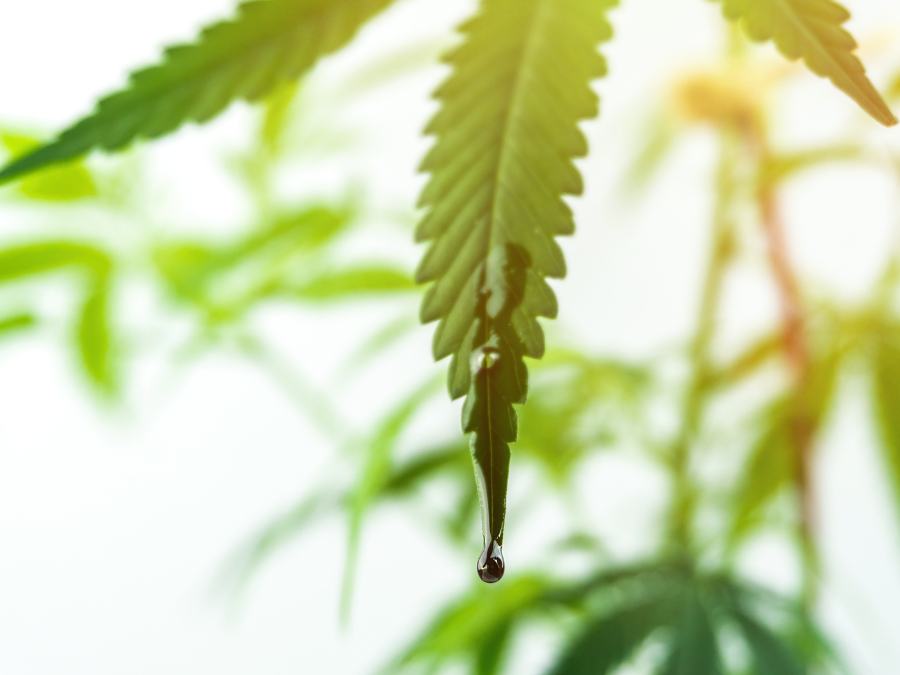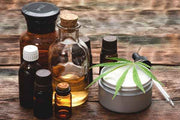Have you been curious about the differences between full spectrum, broad spectrum, and CBD isolate? With so much talk of CBD products lately, it can be hard to keep up with all the terminology. If you’re overwhelmed and unsure which one is right for you, don’t worry – we’ve got you covered. This article will explore the differences between full spectrum vs. broad spectrum vs. CBD isolate to help you find the product that meets your needs.
The world of CBD products can seem confusing at first glance. But after taking a closer look, understanding the nuances between full-spectrum, broad-spectrum and CBD isolate can be easy.
Knowing which one is right for you boils down to what type of effects you’re looking for and what ingredients are important to you. We’ll explain it all in detail so that by the end of this article, you’ll better understand which product fits your lifestyle best.
Ready to learn more? Let's dive in! By the end of this article, you'll have all the information needed to decide which product is right for you. So let's get started!
How Full-Spectrum And Broad-Spectrum CBD Compare
Full-spectrum CBD and broad-spectrum CBD both contain varying amounts of other cannabinoids, such as THC, that naturally occur in the hemp plant. However, full-spectrum CBD contains all of the natural compounds found in hemp plants, including trace amounts of THC, whereas broad-spectrum CBD has had the THC removed. This means that while full-spectrum CBD may provide a more comprehensive range of therapeutic benefits, it can also come with the potential risk of a positive drug test.
CBD isolate is an alternative to full-spectrum and broad-spectrum CBD. It is made by isolating just the cannabidiol molecule from other compounds in the plant and purifying it until only pure CBD remains. Because it contains only one cannabinoid, it is generally less effective therapeutically than full or broad-spectrum products. That being said, some people prefer to use it because they don’t have to worry about any trace amounts of THC showing up on a drug test.
The right product for you depends on your individual needs and preferences. If you want to experience the widest possible range of therapeutic benefits from hemp plants without having to worry about a positive drug test result, then broad-spectrum may be your best bet.
On the other hand, if you don’t mind the risk of traces of THC showing up on a drug test but still want access to many therapeutic benefits, then full-spectrum might be better suited for you. Ultimately, it's all about finding what works best for you.

Pros And Cons Of Full-Spectrum CBD
Full-spectrum CBD has its benefits, but it also carries some drawbacks. To help you decide if it's right for you, it's important to weigh the pros and cons of full-spectrum CBD.
One of the biggest benefits of full-spectrum CBD is that it contains a wide range of beneficial compounds which can work together to provide more powerful effects than any single compound alone.
This means that full-spectrum CBD may provide more relief than broad-spectrum or isolate products. It also allows consumers to benefit from the entourage effect, where several compounds in a product work together to create a synergistic effect.
On the other hand, full-spectrum CBD products contain trace amounts of THC, which can be concerning for certain people who are drug tested for their jobs or have legal concerns about using THC.
Additionally, due to federal regulations on hemp and cannabis products, most full-spectrum CBD products contain less than 0.3% THC, so the amount present is not enough to cause any psychoactive effects in most people.
Full-spectrum CBD can be an effective option for those looking for relief from various conditions, but it's important to do your research and understand the potential risks associated with this type of product before making a purchase. Ultimately, only you know what’s best for your body and lifestyle.

Pros And Cons Of Broad-Spectrum CBD
Broad-spectrum CBD is like the Goldilocks of CBD products - not too much, not too little, but just right. It strikes a balance between full-spectrum and isolate CBD, providing users with the best of both worlds. However, as with anything in life, there are pros and cons to consider when it comes to broad-spectrum CBD.
The most significant advantage of broad-spectrum CBD is that it offers the benefits of full-spectrum CBD without the presence of THC. This means that users can access all of the compounds found in hemp plants (cannabinoids, terpenes, etc.) without having to worry about getting high or failing a drug test. Additionally, since broad-spectrum products contain multiple cannabinoids rather than one isolated compound (i.e., cannabidiol or CBD), they may be more effective at treating certain conditions than an isolate product would be.
However, there are some downsides to using broad-spectrum CBD as well. For starters, it tends to be more expensive than other forms of CBD due to its higher cannabinoid content and its ability to provide multiple benefits at once. Additionally, since these products contain only trace amounts of THC (0.3% or less), they may not produce the same "entourage effect" that full-spectrum products do; this is because THC plays an important role in activating certain cannabinoids for maximum therapeutic benefit – something that cannot happen if THC is completely absent from a product's formula.
At the end of the day, whether or not broad-spectrum CBD is "right" for you depends on your individual needs and preferences. If you're looking for a way to access all of hemp's natural benefits without any psychoactive effects or worries about drug tests, then this could be an ideal option for you; however if you'd rather experience the full entourage effect offered by full spectrum products then you may want to look elsewhere instead. Ultimately only you can decide which type of product is best suited for your lifestyle!
Which Type Of CBD Is Right For You?
With the pros and cons of broad-spectrum CBD in mind, it's time to consider which type of CBD is right for you. Whether you're looking for a robust experience or something more tailored to your needs, each CBD type offers unique benefits.
Full-spectrum CBD contains all of the naturally occurring cannabinoids found in hemp, including trace amounts of THC. This type of CBD is ideal for those seeking maximum therapeutic benefit from their product. However, because full-spectrum products contain THC, they are not legal in all states and may produce psychoactive effects in some users.
Broad-spectrum products offer many of the same benefits as full-spectrum without the presence of THC. This makes them more widely accessible than full-spectrum products and allows people who don't want to consume any THC to take advantage of all that hemp offers.
CBD isolate is exactly what it sounds like—a pure form of CBD that doesn't contain any other compounds or cannabinoids. This type of product is ideal for those who want an ultra-potent dose that doesn't come with any additional ingredients. It also eliminates the risk of consuming trace amounts of THC or other compounds found in hemp extract, making it a great option for those who need to pass drug tests or don't want to experience any psychoactive effects whatsoever.
No matter which type you choose, make sure you're getting high quality products from a trusted source so you can enjoy all the potential benefits that CBD has to offer. When selecting your product, consider your specific needs and preferences so you can find the perfect fit for you!

What About CBD Isolate?
CBD isolate is the purest form of CBD available on the market. It's made by extracting CBD from the cannabis plant and then further processing it until only a single molecule of cannabidiol remains. This means that all other elements, including terpenes, flavonoids, and other cannabinoids have been removed. As such, it contains no THC whatsoever.
Because it's so pure, CBD isolate can provide more concentrated doses than broad spectrum or full spectrum products. It also offers greater flexibility when it comes to customization: you can add specific doses of CBD isolate to your own products or use them in recipes for edibles and topicals.
Plus, because there are no other compounds present in CBD isolate, it has virtually no taste or smell – making it an ideal choice for those who want to avoid any cannabis-related flavors or aromas.
CBD isolate is an excellent option for those looking for a powerful yet discreet way to consume cannabidiol. It can be taken alone as a sublingual tincture or added to foods and drinks for convenient consumption. Whether you're seeking relief from chronic pain or just looking to relax after a long day, CBD isolate could be the perfect solution for you.
What Does The Research Say About CBD?
CBD has been gaining a lot of attention lately as more and more research is conducted on its potential benefits. While there is still much to learn and understand, CBD has been linked to a variety of therapeutic effects. From helping with chronic pain relief to reducing anxiety and improving mood, the research suggests that CBD may be beneficial for many people.
The most important factor when it comes to CBD is understanding the different types available. There’s full spectrum, broad spectrum, and CBD isolate – but what do these terms mean? Full spectrum products contain all the compounds found in the cannabis plant (including THC) while broad spectrum products contain all compounds minus THC. On the other hand, CBD isolate contains only pure CBD extract, with no other cannabinoids present.
Depending on your needs and goals, one type of product may be better suited than another. If you’re looking specifically for pain relief or anti-inflammatory effects, then full or broad spectrum products may be best as they contain additional compounds that work together in what’s known as the “entourage effect”.
If you’re trying to avoid any trace of THC however, then an isolate product would be ideal. Ultimately it boils down to personal preference and experimentation – so don’t hesitate to try out different types until you find what works best for you!

Are Different Types Of CBD Better For Different Uses?
It’s important to understand the differences between full spectrum, broad spectrum and CBD isolate, so you can choose the best one for your needs. Full spectrum CBD oil contains all of the cannabinoids from the cannabis plant including THC, which may create a stronger effect than other types of CBD.
Broad spectrum CBD oil is similar to full spectrum but has had all traces of THC removed, so it won’t produce any psychoactive effects. Lastly, CBD isolate has been distilled and processed to remove any other compounds or cannabinoids leaving only pure, isolated CBD.
Depending on what you are looking for in terms of relief or effects, you may prefer one type of CBD over another. For example, if you’re looking for something that won’t produce any psychoactive effects and delivers more concentrated doses of CBD, then an isolate might be a better option. On the other hand, if you want to benefit from the “entourage effect” - where all of the cannabinoids work together - then full-spectrum might be a better choice. Ultimately, it comes down to personal preference and what works best for your individual needs.
No matter which type of CBD you decide to use, make sure it is sourced from a reputable supplier and lab tested for quality assurance.
CBD Has Many Benefits and Can Be Tailored Directly Toward Your Health Needs
In conclusion, the type of CBD you choose is up to you and depends on your individual needs. Full-spectrum CBD contains all the beneficial compounds found in hemp, including trace amounts of THC, while broad-spectrum CBD contains all the compounds except for THC. CBD isolate is pure CBD with no other cannabinoids present.
When choosing between full-spectrum and broad-spectrum CBD, consider how much THC you are comfortable with or if you want to avoid it altogether. Research indicates that full-spectrum products may be more effective than their isolated counterparts due to the “entourage effect” created by the combined compounds. Ultimately, what type of CBD works best for you will depend on your goals and needs.
Finally, it’s important to remember that there is still more research needed to fully understand the effects of different types of CBD on various conditions. With so many options available today, it can be difficult to know which one is right for you. Is there a particular type of CBD that could work best for you?



